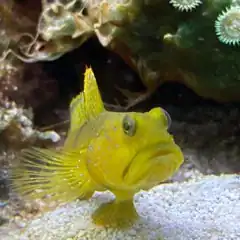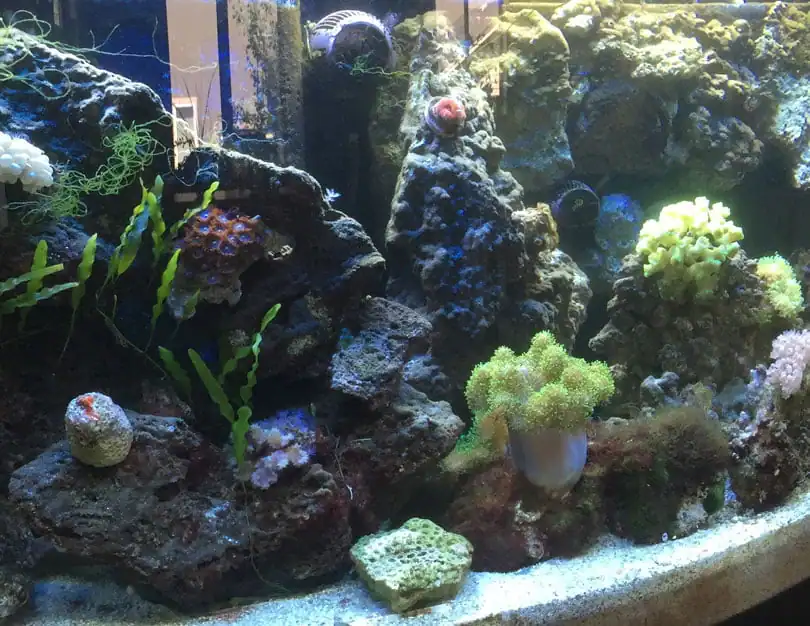Salt water aquariums provide a beautiful and peaceful environment for fish and other aquatic creatures, and maintaining a healthy and stable environment is essential for their health and well-being. One aspect of aquarium maintenance is maintaining the right salinity levels in the water, and many aquarium owners wonder if water softener salt is a safe and effective solution for this purpose.
This article explains some of the differences between purpose made Aquarium salt and salt for Water Softeners.
If you’re an experienced aquarist or just starting out, this article will supply you with valuable insights on the topic and assist you in making educated decisions regarding your fish’s health and welfare.
Is Water Softener Salt Safe for Aquariums?
Do not use Water Conditioner Salt directly in an aquarium!
Water softener salt must never be used as a substitute for aquarium salt mix, which contains an exclusive combination of minerals and other elements that are vital for the well-being of aquatic life.
The best water to use in either a Saltwater Aquarium or a Freshwater (Tropical) aquarium is water processed through a Reverse Osmosis filter. To read more about Reverse Osmosis filtering and how it is different than water softening, see Water Softener Salt And Reverse Osmosis: What’s the Difference?
To sum this up, aquarium owners should not add water softener salt directly in their aquariums. If the only water you have in a pinch is water from your tap that has been softened by a household water softener, and the water is free of iodine or rust inhibitors, using a little of it should not kill your fish. I would only do this in an emergency mode, e.g. a massive tank or filter leak where you can’t wait to go the the Local Fish Store and buy some R.O water.
Can I Add Water Softener Salt Directly To An Aquarium?
Nope! Don’t do it.
Adding water softener salt directly to an aquarium is not recommended and can be harmful to fish and other aquatic life. Water softener salt is designed for use in household water systems, and contains additives that can be toxic to aquatic life, such as iodine.
Why would you risk thousands of dollars of aquarium creatures to save a few bucks on aquarium salt?

I have kept a number of Saltwater tanks over many years. I can’t think of a single time where the timing on adding salt was critical enough to not just go to the Local Fish Store or order some proper aquarium salt online. Even during COVID you could postpone a water change for a while instead of risking your tank inhabitants.
What Is The Difference Between Aquarium Salt and Water Softener Salt
In general, aquarium salt has various trace minerals and buffers that help fish and their environment thrive whereas water softener salt contains additives such as iodine or rust inhibitors, which are very harmful to fish.
In many cases, different salts can be used as a replacement or supplement of each other, but when it comes to the health of your aquarium it’s generally best to use the tool designed for the job…in this case, aquarium salt.
- Aquarium Salt – Specifically formulated for use in aquariums and contains a blend of minerals and other elements that are important for the health of fish and other aquatic life. This type of salt is designed to mimic the natural conditions in which fish and other aquatic life thrive, and it helps to maintain a healthy and stable environment for these creatures.
I have used Instant Ocean Reef Crystals for many years in my Reef Aquariums - it is great for fish, softies, invertebrates and for maintaining the health of live rock. It is completely consistent between batches and mixes well when preparing water for new tanks or water changes. This link takes you to the big bucket that makes 160 gallons of saltwater, but it is also available in other sizes.
- Water Softener Salt – Designed for use in household water systems to treat hard water. It does not contain the same blend of minerals and other elements found in aquarium salt and may contain additives, such as iodine, that can be harmful to fish and other aquatic life.
Aquarium salt is custom-made for aquaria and contains the necessary minerals and constituents that are beneficial to your underwater creatures’ health. To guarantee they can live in harmonious conditions in their tank, you must use the appropriate kind of salt for your tank.
How Does the Amount of Salt in the Water Affect Fish
Salt in the water of an aquarium helps to regulate osmotic pressure, which helps fish absorb oxygen and other essential nutrients. It also provides a natural barrier against parasites and disease and can help to reduce stress in fish.
Too little salt and there won’t be enough for your fish to absorb oxygen and nutrients, while too much salt can cause stress and even death in aquarium inhabitants. That is why it is so important to use aquarium salt mix instead of water softener salt when setting up or maintaining an aquarium.
However, salt levels that are too high can damage the delicate balance of the aquarium’s ecosystem and can harm the gills, fins, and skin of fish. In severe cases, high salt levels can cause stress, organ damage, and even death. Note that sometimes, as the water naturally evaporates from your tank, the salt concentration goes up in the remaining water. Be sure to establish a maintenance schedule that replaces evaporated water and check the salinity levels frequently with a hydrometer until you get a feel for keep the levels balanced.
There are fancier, more expensive ways to measure salinity in your tank, but why bother? These simple float based hydrometers work every time, don't need batteries, and are totally accurate enough for most home reef keepers.
It is important to maintain the correct salinity levels in an aquarium to ensure the health and well-being of fish. The ideal salinity level will vary depending on the species of fish, but a general guideline is a specific gravity of 1.020 to 1.025. It’s important to measure the salinity levels regularly and to add salt to the aquarium gradually and in small amounts to avoid drastic changes.
Final Thoughts
Aquariums require a delicate balance of salt and other trace minerals to ensure the health and well-being of aquarium inhabitants. Water softener salt should never be used in aquariums as it contains additives, such as iodine, which can be harmful to fish.
Instead, aquarium owners should use aquarium salt mix specifically formulated for aquariums that contain the necessary minerals and constituents beneficial to aquatic life. It is important to measure salinity levels regularly and add small amounts gradually to avoid drastic changes that could harm or even kill your fish. If you have a whole house water softener, be sure to use water from other sources to maintain your aquarium.

With proper management of aquarium salinity levels, you will have healthy, happy fish living in harmony with their environment!
Table of Contents
Looking for information about salt in your Koi Pond? See our article Salt For Your Koi Pond: Why Water Softener Salt Just Won’t Do.









